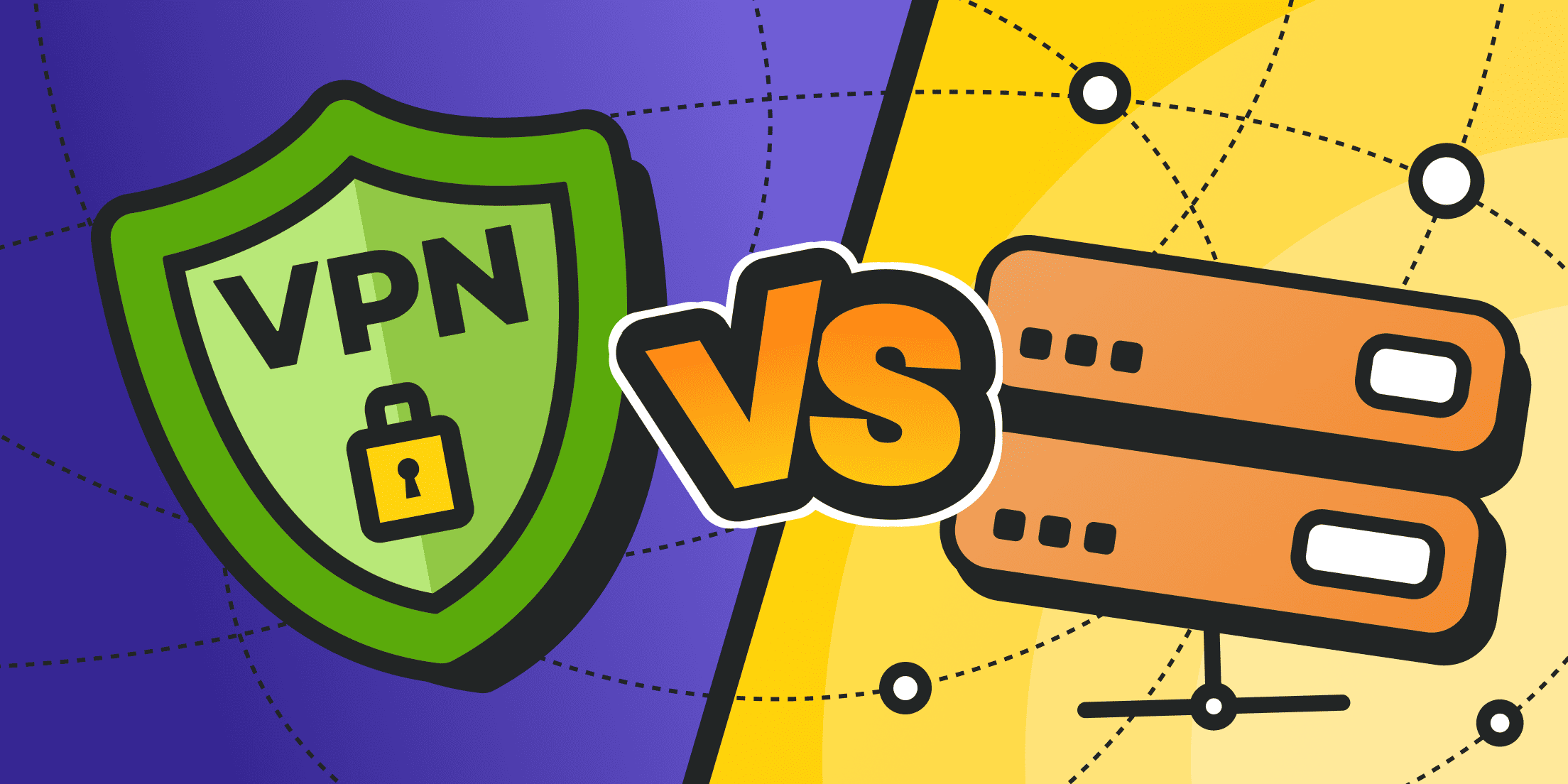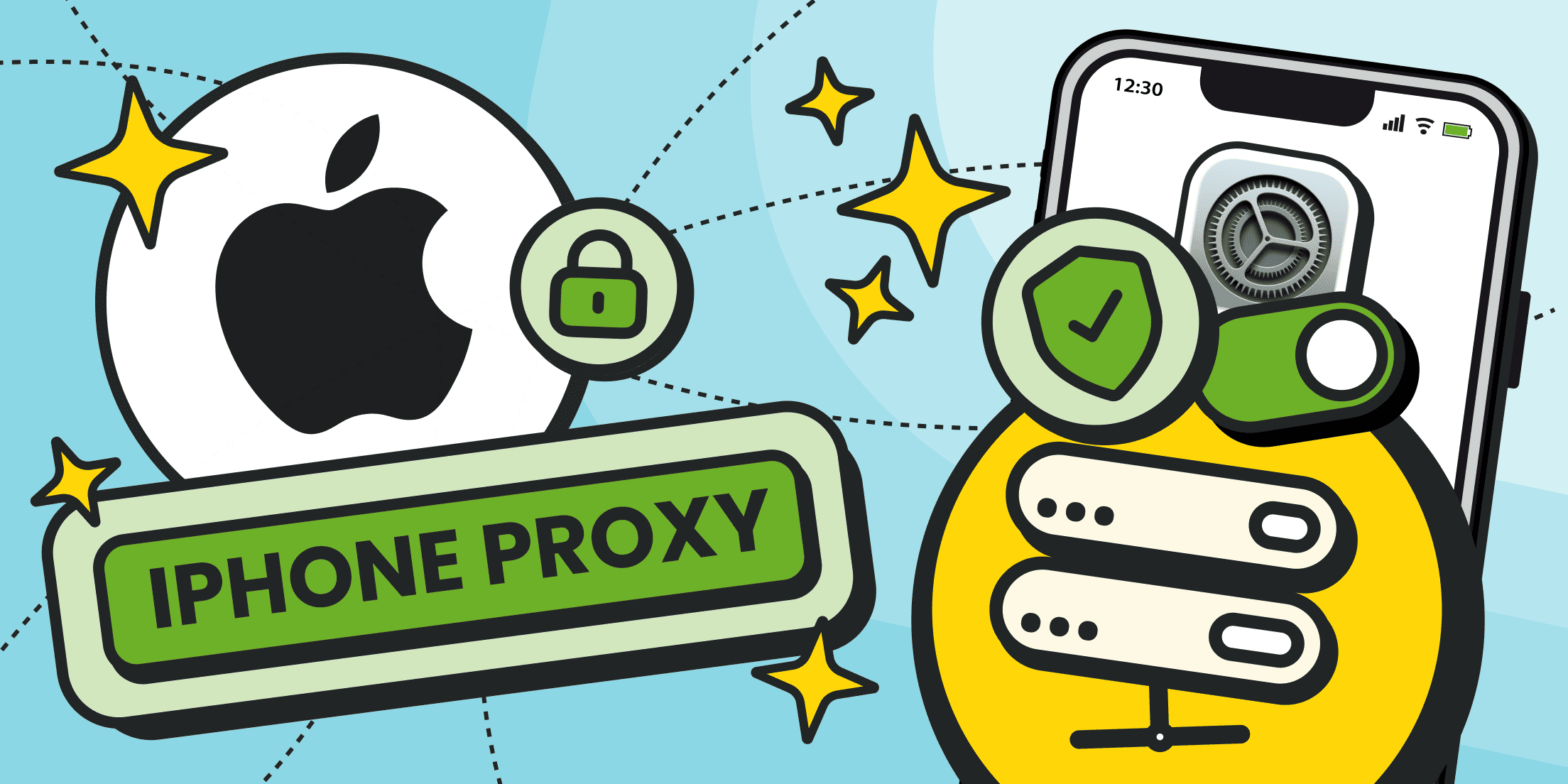The proxy vs VPN debate remains a popular topic in discussions about secure internet usage in 2025. Both tools mask your online presence, but their protection levels are nowhere near the same. VPNs give you complete privacy with end-to-end encryption that keeps your data secure even if someone intercepts it. Proxy servers don't encrypt your connection, which makes them less secure – especially the public ones.
Your online safety depends a lot on which of these security tools you pick. VPNs protect you at the operating system level and route all your traffic through encrypted channels, while proxy servers just redirect traffic from specific apps. This leaves users wondering whether to choose a method that exemplifies the proxy vs VPN challenge. Moreover, the ongoing proxy vs VPN discourse influences emerging cybersecurity standards.
In this article, we will describe their main differences in the hope that they will be helpful in your choice of the best solution.
VPN and Proxy Basics

Let's look at how VPNs and proxy servers work to understand their key differences. These tools act as middlemen between your device and the internet, but they work quite differently. In fact, the debate over VPN vs proxy reflects fundamental design choices. The interplay between various protocols further illustrates the overall proxy vs VPN scenario in digital communications.
What is a VPN and How it Works
To clarify the difference between VPN and proxy, let’s see how a VPN functions at its core. A Virtual Private Network creates an encrypted tunnel between your device and the internet. Your internet traffic goes through a private service instead of your regular internet service provider (ISP). Your data gets encrypted before it leaves your device, so nobody can read it even if they try to intercept it.
When comparing proxy vs VPN directly, VPN encryption is a vital advantage. The VPN connects through a handshake process, exchanging encryption keys with your device. After that, data travels safely through the tunnel to the VPN server. The server then decrypts it and sends it on to your destination. Websites respond back through that same secure path.
Unlike a simple VPN vs proxy debate that focuses only on IP masking, a VPN protects everything at the system level. This includes all apps and browsers, ensuring end-to-end encryption. Premium VPN services use military-grade 256-bit encryption that keeps your data safe. Overall, the VPN and proxy difference becomes evident once you consider the full encryption coverage provided by a VPN.
A Closer Look at How a Proxy Server vs VPN Operates
Proxy servers act as intermediaries between your device and the internet by forwarding your web requests. These servers mask your original IP address with their own but do not encrypt your data. In a detailed proxy vs VPN comparison, the lack of encryption is a significant shortcoming for proxies, especially public ones.
You’ll find three main types of proxy servers, each with unique pros and cons in proxies vs VPN scenarios:
- HTTP Proxies. These servers only handle web page traffic and route all your browser activity through their system.
- SOCKS Proxies. These can handle different types of traffic but run slower because more people use them.
- Transparent Proxies. Networks often use these without telling users to monitor activity or manage public Wi-Fi users.
For casual browsing, you might ask yourself, “Should I use proxy or VPN?” In most cases, a VPN’s encryption provides better overall security, though a proxy may suffice for simpler needs. In some work environments, people rely on both VPN and proxies to balance convenience and security, but it’s crucial to know when each tool is most appropriate. Ultimately, when comparing VPN and proxy usage side by side, encryption often becomes the deciding factor for users who handle sensitive data.
Although some might think VPN & proxy solutions are interchangeable, the reality is they serve quite different purposes, especially regarding data encryption. Today, many organizations provide employees with VPN and proxy tools for different tasks, ensuring both secure data handling and traffic filtering. Still, if you’re wondering what is the difference between proxy and VPN, the core answer is encryption and scope: VPNs secure all traffic while proxies only mask specific app traffic and often leave data unencrypted.
Worldwide Coverage
5 continents, No limits
Access our proxy network with more than 200 locations and over 10 million IP addresses.
Core Security Features Comparison in Proxy vs VPN
Security is the primary consideration when deciding between proxy vs VPN solutions. Let's look at why these differences matter to keep you safe online.
Encryption Capabilities
In any proxy vs VPN assessment, encryption is pivotal. VPNs use military-grade encryption protocols to secure your data. They create encrypted tunnels through IPsec that protect all information moving between endpoints. Your data stays unreadable to anyone who isn't authorized, giving you reliable protection against threats.
Proxy servers work without any encryption. They just pass your traffic through another server, which leaves your data open to attacks. This creates a problem because your Internet Service Provider can still see what you're doing online, even though your IP address is hidden.
Data Protection Methods
From a proxy vs VPN standpoint, VPNs protect data at the operating system level, covering every application’s traffic. This means every bit of data leaving your device stays encrypted until it reaches where it's going.
VPNs give you:
- IPsec tunneling for secure communication.
- Operating system level integration.
- Complete traffic encryption.
Proxy servers don't offer much data protection. They focus on routing traffic through other servers without adding security features. This simple approach means your data could be caught in man-in-the-middle attacks or other interception attempts.
Traffic Routing Differences
In a proxy vs VPN comparison, traffic routing underscores major security distinctions. VPNs create secure tunnels that encrypt your data before sending it. Even if someone catches your connection, they can't figure out what information is passing through.
Proxy servers just forward your traffic. They hide your IP address but don't protect the actual data. This means anyone watching the traffic between you and the proxy server might see what you're sending.
VPNs also protect you from advanced surveillance. Your internet provider only sees that you're connected to a VPN server, nothing else about what you're doing online. This privacy extends to government monitoring, website tracking, and cyber threats.
This becomes especially important when you're using public Wi-Fi. Proxy servers might hide your IP, but they can't protect you from security threats on unsecured networks. VPNs create a secure space for everything you do online, whatever the network's security level.
Privacy Protection Capabilities in Proxy vs VPN

Privacy is a vital factor that sets VPNs and proxy servers apart. Each technology takes a different approach to protect user data. Research shows clear differences in how these tools handle sensitive information and protect identities.
IP Address Masking Methods
While both proxies and VPNs hide your IP address, the proxy vs VPN difference becomes clear once you consider encryption and comprehensive traffic coverage.
VPNs create encrypted tunnels that shield your original IP address completely, making all traffic appear to come from the VPN server. Proxy servers work differently. They act as middlemen and replace your device's IP address with their own.
Datacenter proxies run through physical data centers and provide quick masking but don't offer much privacy. Residential proxies use IP addresses from real devices, which websites see as more legitimate. Notwithstanding that, VPNs are better at masking than proxies because they work at the operating system level. They secure all device traffic instead of just specific apps.
Residential Proxies
Perfect proxies for accessing valuable data from around the world.
Data Logging Policies
For many, the proxy vs VPN debate also includes which service logs more user data. Reputable VPNs often feature strict no-logs policies, while some proxies may track and store information. According to recent research by Privacy Canada, VPN services collect several types of data:
- 29% collect personal details.
- 24% keep IP address logs.
- 57% save connection times and bandwidth use.
- 51% record device types.
- 92% store payment details.
- 9% track browsing history.
Quality VPN providers are open about their data collection. They explain what they collect, why they need it, and how long they keep it. Also, reliable VPNs follow strict no-logs policies. This means they can't connect any user to specific activities on their network.
User Anonymity Level
User anonymity in a proxy vs VPN framework can vary. Proxies offer different anonymity tiers, but VPNs typically deliver a more consistent level of privacy due to full-tunnel encryption.
Proxy servers can give different levels of anonymity:
- No anonymity. Servers can see your IP address and know you're using a proxy.
- Low anonymity. Your IP stays hidden, but servers know you're using a proxy.
- Average anonymity. Servers spot proxy use but getthe wrong IP information.
- High anonymity. Servers can't detect your IP or proxy use.
Free proxy services might risk your privacy by watching traffic patterns and selling data to others. According to VPN Alert, About 14.4% of proxies record network traffic, while 27% save original IP addresses.
VPNs give better anonymity through detailed encryption and secure tunneling protocols. Trusted VPN services use no-log policies that make it impossible to trace online activities back to users. This extra privacy protection helps especially when you have data breaches and law enforcement investigations.
Speed and Performance Analysis in Proxy vs VPN

Speed is another factor in the proxy vs VPN debate. Recent performance tests show these technologies are quite different in their connection speeds and network reliability.
Connection Speed Tests
Tests show that proxy vs VPN speeds can differ greatly depending on server load, distance, and encryption overhead.
For example, you'll get faster connections when connecting to servers near your location. Server load also affects how well things work since overcrowded servers handling too many connections can slow things down.
VPN speed tests under controlled conditions reveal: download speeds range from 5-40 Mbps based on usage:
- 1-5 Mbps is enough for simple browsing.
- 10-25 Mbps works well for HD streaming.
- 25-40 Mbps lets you connect multiple devices.
Proxy servers, on the other hand, tend to have more speed issues. When a single proxy server handles many users at once, you'll notice more delays. Free proxy services are even slower because they have:
- Limited infrastructure.
- Fewer configuration options.
- Basic maintenance protocols.
Tests show VPNs keep more stable connections, while proxy connections drop more often. However, VPN speeds can drop by 10-30% compared to direct connections because of encryption overhead.
Server Network Coverage
Large server networks are a staple of premium VPNs, giving them an edge in proxy vs VPN performance comparisons. Premium VPN services put a lot of money into their infrastructure and offer large server networks in many locations. This wide coverage helps users:
- Connect to nearby servers for better speeds.
- Get around geographic restrictions.
- Keep stable connections through load balancing.
SOCKS5 proxies work differently in certain situations. These proxies can handle more bandwidth without encryption overhead, making them good for:
- HD streaming.
- Large file transfers.
- Torrenting applications.
Each technology handles server loads differently. VPNs use advanced load-balancing to spread user connections across multiple servers for consistent speeds. Proxy servers are built as single-point connections and often can't handle many users well, which creates slowdowns.
VPNs now use new speed optimization techniques like:
- Switching protocols for better performance
- Picking servers automatically based on load
- Finding faster routes to avoid congestion
VPNs can sometimes make your internet faster when internet providers try to throttle traffic. This happens because encrypted VPN traffic bypasses these throttling systems, letting your connection run at normal speeds.
VPN vs Proxy: Making the Right Choice

Ultimately, your choice in the proxy vs VPN debate depends on your security needs. Your intended usage, privacy requirements, and budget will help you make the right choice.
When to Use a VPN
A VPN stands out as the best option for complete privacy and comprehensive encryption, especially in the proxy vs. VPN context. VPNs are essential for handling sensitive information and financial transactions online. Their military-grade encryption protects personal data during online banking or shopping.
Premium VPN services are great at:
- Securing remote work connections.
- Protecting financial transactions.
- Safeguarding personal information.
- Bypassing geographic restrictions safely.
When to Choose a Proxy
Proxy servers work best for simple web browsing and content access. These tools help users hide their IP addresses when extensive security isn't needed. Companies use proxy servers to track employee internet usage and access region-restricted content.
A proxy server works well for:
- Simple IP address masking.
- Accessing non-sensitive content.
- Website administration tasks.
- Content filtering in organizations.
Conclusion on VPN and Proxy Difference

A complete proxy vs VPN comparison shows clear differences in their security features and ground applications. VPNs offer better protection through military-grade encryption and secure all device traffic while keeping decent connection speeds. VPN speeds might drop by 10-30%, but their reliable security features make them crucial to handle sensitive data and financial transactions.
Proxy servers are more straightforward and cheaper, but they work best for simple IP masking and content access. However, when weighing proxy vs VPN, security should be a top consideration. Many proxy servers don't have encryption capabilities, which makes them risky for sensitive information, especially on public networks. However, they are great for simple tasks where comprehensive protection is not required.




